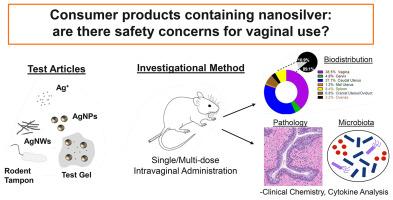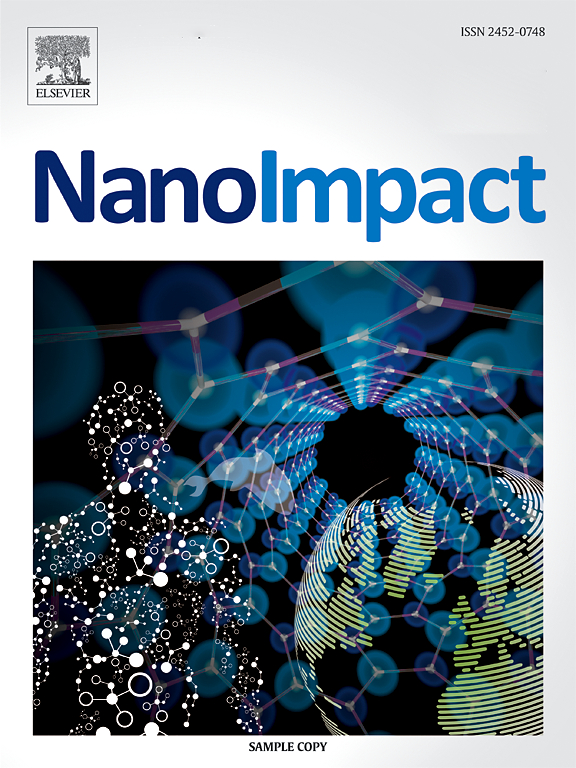银纳米粒子进入雌性大鼠生殖道时的生物分布和毒性潜力。
IF 5.5
3区 环境科学与生态学
Q2 ENVIRONMENTAL SCIENCES
引用次数: 0
摘要
由于离子银和纳米银具有抗菌活性,其在卫生用品中的应用日益广泛。虽然许多研究都在实验室环境中考察了纳米银的影响,但对其对生殖组织的影响以及阴道内暴露时的生物分布和毒性的了解还很有限。如果离子银或纳米银通过阴道内暴露进入邻近组织和内部组织,过度使用含银卫生用品可能会对妇女的健康造成潜在威胁。本研究调查了雌性费舍尔 344 大鼠阴道内银暴露对单次和多次剂量的含银商用产品以及标准纳米银材料的影响。研究人员开发了定制卫生棉条,以模拟实际使用场景。对组织生物分布的分析表明,观察到银的上皮渗透和再分布,大部分施用的银在粪便中排出(8-44%),次生组织中含有 1-18% 的剂量,主要集中在生殖道。在随后进行的一项毒性研究中,阴道组织病理学显示出细胞炎症反应(中性粒细胞浸润),这与单次给药后存在外来银物质有关。有趣的是,与对照组相比,多次接触银时组织病理学发生率没有明显差异。急性接触纳米银材料后进行的临床化学和血液学分析未发现明显异常。总之,急性阴道接触纳米银材料和离子银会导致银的有限持久性、局部组织反应性、银的上皮穿透性导致银在远处器官的蓄积,并主要通过粪便排出体外。体外数据表明,正常阴道菌群可能会发生变化。该领域仍缺乏长期研究。本文章由计算机程序翻译,如有差异,请以英文原文为准。

Biodistribution and toxic potential of silver nanoparticles when introduced to the female rat reproductive tract
The prevalence of ionic silver and silver nanomaterials in hygiene products has been increasing due to their antimicrobial activity. While numerous studies have examined the effects of nanosilver in laboratory settings, there is a limited understanding of its impact on reproductive tissues, as well as its biodistribution and toxicity upon intra-vaginal exposure. If ionic or nanosilver enters adjacent and internal tissues via intra-vaginal exposure, the overuse of hygiene products containing silver may potentially threaten woman's health. This study investigated the effects of intra-vaginal silver exposure in Female Fischer 344 rats to single and multiple doses of a commercial product containing silver, along with standard nanosilver materials. Custom tampons were developed to simulate practical usage scenarios. The analysis of tissue biodistribution revealed that epithelial penetration and redistribution of silver was observed with most administered silver eliminated in feces (8–44 %), and secondary tissues containing 1–18 % of the dose, predominantly localized in the reproductive tract. In a subsequent toxicity study, vaginal histopathology indicated a cellular inflammatory reaction (neutrophil infiltration) associated with the presence of foreign silver material upon a single administration. Interestingly, no noticeable difference in histopathology incidence was observed upon multiple exposures to silver compared to the control group. Clinical chemistry and hematology analyses following acute exposure to silver nanomaterials showed no significant abnormalities. Overall, acute vaginal exposure to silver nanomaterials and ionic silver resulted in limited silver persistence, local tissue reactivity, epithelial penetration of silver resulting in accumulation in distant organs, and elimination primarily through feces. In vitro data suggested potential alterations in normal vaginal flora. Long-term studies are still lacking in this area.
求助全文
通过发布文献求助,成功后即可免费获取论文全文。
去求助
来源期刊

NanoImpact
Social Sciences-Safety Research
CiteScore
11.00
自引率
6.10%
发文量
69
审稿时长
23 days
期刊介绍:
NanoImpact is a multidisciplinary journal that focuses on nanosafety research and areas related to the impacts of manufactured nanomaterials on human and environmental systems and the behavior of nanomaterials in these systems.
 求助内容:
求助内容: 应助结果提醒方式:
应助结果提醒方式:


